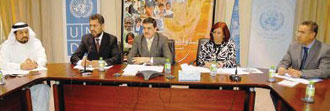
|
 |
 |
|
|
|
|
|
|
|
|
|
|
|
|
|
|
|
|
|
|
|
|
|
|
Establishing a Men-Network to Combat VAW in BahrainViolence against women is a global phenomenon that transcends countries, religions, sects and cultures. However, the continuous increase of this phenomenon in the Arab World can be attributed to many interconnected cultural, social, legal and political factors. For instance, religious interpretations and the patriarchal culture give men the right to use violence against their wives and daughters. In addition to this, the punishments and laws used are ineffective and hence cannot protect women from domestic violence; to the extent that, in some countries, honour-killing has become a common practice. Also, there is a lack of care and state services for the vulnerable groups in society, especially women. Women in Bahrain, as in any other conservative country, are subjected to domestic violence due to various reasons: the obvious shortcomings in the Penal Law, the existence of a culture that encourages violence against women, the lack of awareness regarding women’s rights, the absence of a mechanism for demanding their rights and defending themselves from physical and psychological harm at home or work; finally, the lack of care for women at both the state institutions and civil society organizations. The Supreme Council for Women published a study last month on violence against Bahraini women. The study concluded that most of cases are committed by husbands and that the lower the income of a family the higher the probability of violence in it.
According to the study, verbal insults are the most common form of abuse, with a percentage of 12.1%, followed by 11.6% for degradation, and 9.3% for snubbing. The percentages of women evicted of the house, beaten and denied their allowances were close; followed by desertion, ignoring, pushing, slapping and smacking. The lowest percentage is for voluntary and non-voluntary confinement, rape and beating with an object. The study also noted that the desire for dominance is among the most common reasons for the violent behaviour of husbands against their wives, as well as social upbringing which aids in the production of violence. The study emphasized the role of cultural heritage as a factor that is responsible for the violence of men against women, especially within the family. This is in addition to some specific religious interpretations that justify the husband’s right to beat his disobeying wife. In the context of responding to violence against women, a campaign was launched on 15 July by the United Nation’s Office in Bahrain entitled ‘Bahraini Men’s Network for Combating Violence against Women’. The coordinator of the UNDP, Sayed Agha, said that ‘the network includes 20 members representing MPs, politicians, businessmen and journalists who were chosen for their active role in society in order to promote the role of the network in society’. He added that the Network is going to work through specific tools and mechanisms to raise awareness to eradicate violence against women. Agha stressed that violence causes poverty, social problems and decreases women’s participation in development. The Secretary General for the Supreme Council for Woman, Lolwa Al Awadi, explained that violence against Bahraini women is not exclusive to husbands, but includes fathers and brothers. She also stressed the need for studying violence at work as well. In addition to this, Al-Awadi stated that spreading awareness through the press, conferences and teaching human rights as a subject, will act as preventative measures against violence. Moreover, she added that establishing a fund to ease the suffering of women in courts, amending the Code of Procedures in Islamic courts, as well as the Law of Evidence and revising the Penal Law are all steps that can be taken to resolve the problem of violence. The State Minister for Foreign affairs, Nazar Al Baharna, stressed the importance of community participation in the combating violence programme and called for official and civil institutions to support the Network and unify their efforts against all forms of violence. Bahraini women organizations praised the establishing of the Network, and the President of Bahrain Young Ladies’ Association, Samira Abdulla, expects that the Network will have an active role in fighting violence. Moreover, the Director General of the Batelco Centre for Combating Domestic Violence, Penh Bosbon, said that ‘the set back in confronting violence against women is due to the fact that men are not involved in the matter’. The Second Vice-President of the House of Representatives, Salah Ali, announced that a number of MPs have joined the Network, adding that men are able to interfere to put an end to violence against women and help in creating a culture that sees the use of violence against women as unacceptable. |
